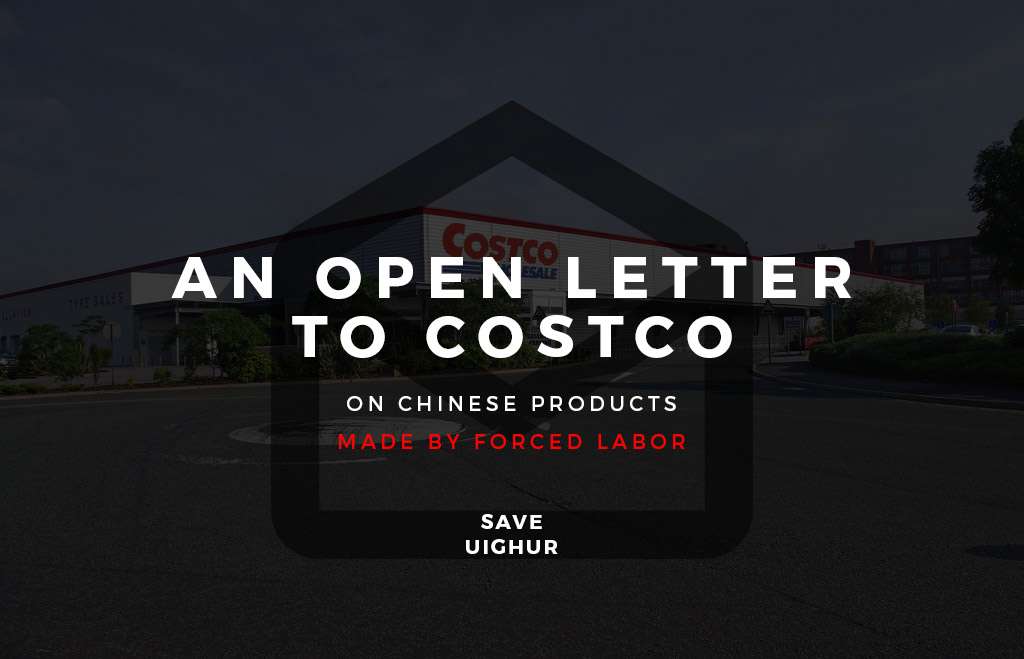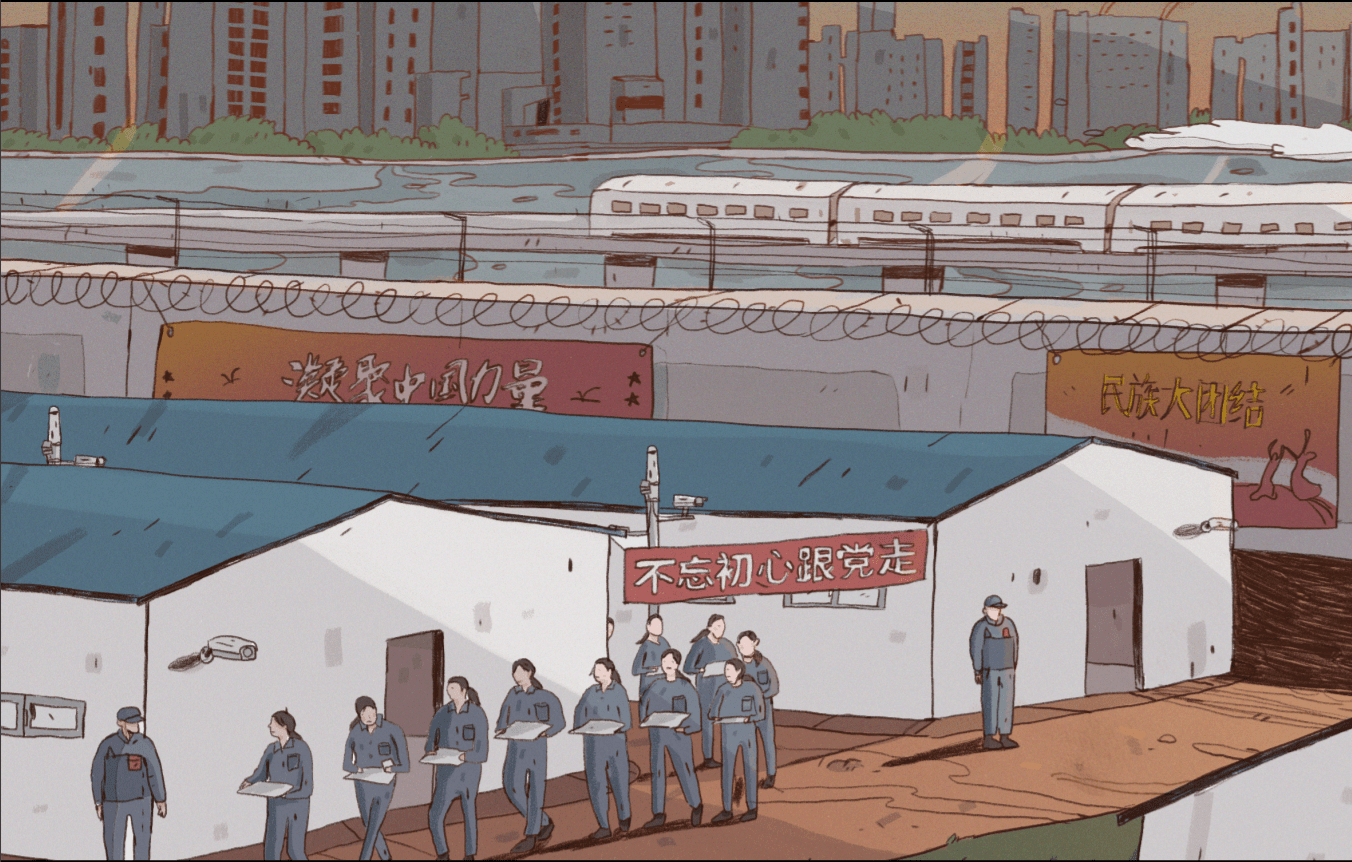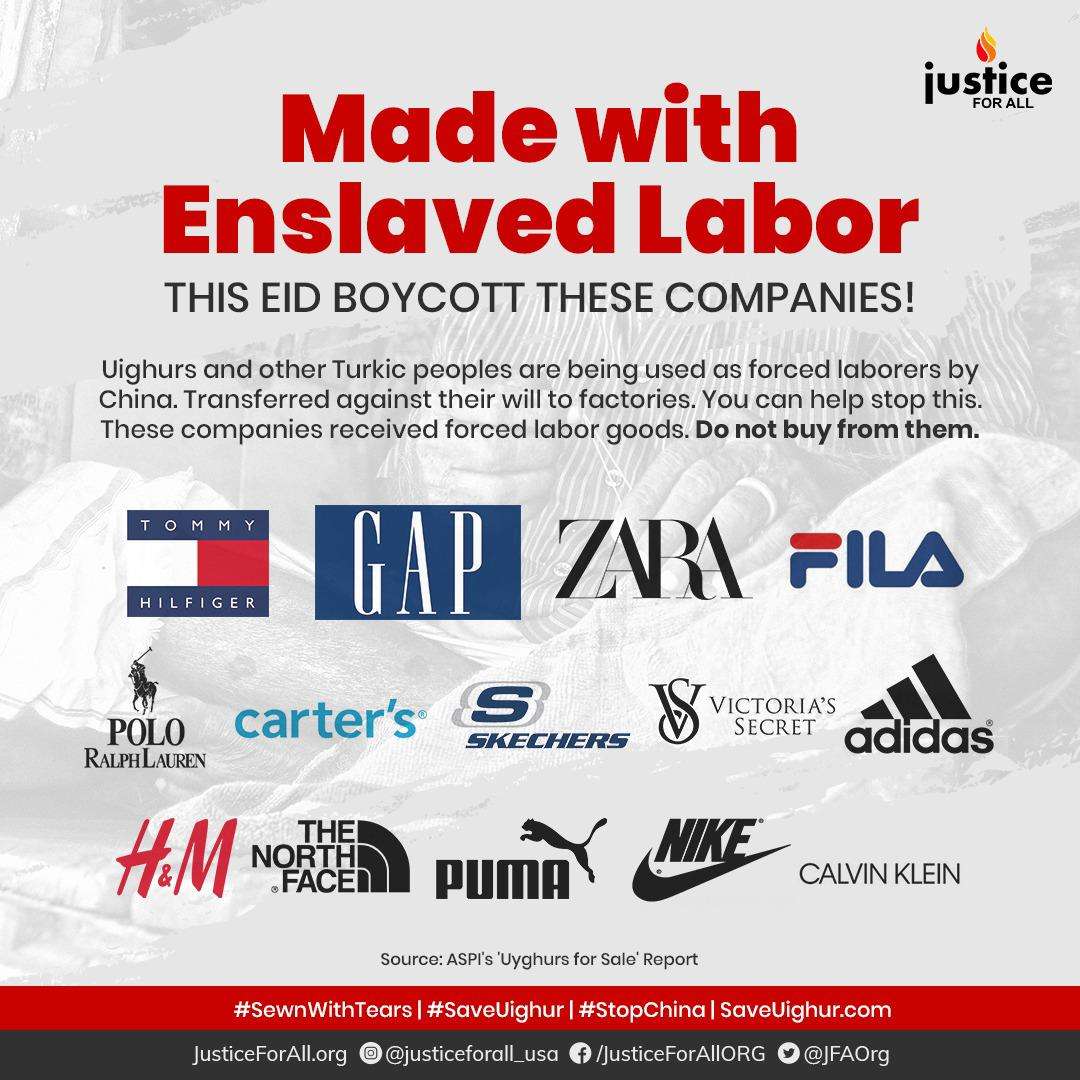December 8, 2021 For Immediate Release Contact: Hena Zuberi hena@justiceforall.org (202) 922-5878 (Washington D.C.) Justice…
Open Letter to Costco On Chinese Products Made by Forced Labor

President & CEO Craig Jelinek
Costco Wholesale Corporation
999 Lake Drive
Issaquah, WA 98027
November 15, 2019
We are deeply troubled by Costco’s recent decision to continue to sell Absorba pajamas. While you have sought to assure us that this product is free of slave labor, we would like you to consider the points in this letter.
Costco’s decision to remove these items from your shelves, as any responsible American company would was welcomed. However, the pajamas can now be purchased using a coupon offered on your web site. This reversal of your earlier decision is very concerning.
Costco was named in the recent hearings on the Uyghur persecution in the United States Congress in China. We are glad that lawmakers are on the side of justice for the Uyghur and are considering expanding the investigation to beyond just Chinese suppliers, but also to American beneficiaries of forced labor.
The South China Morning Post reports that U.S.-based scholars and experts spoke before legislators about how Uyghurs who have been forcibly held in detention centers have been put to work in factory jobs. Companies that used these factories staffed by Uyghurs and other Turkic minorities would receive government subsidies for each individual trained and employed, along with shipping subsidies. This cheap labor along with the government subsidies would result in very low manufacturing costs, “undercutting global prices,” according to testimony presented at the hearing by the Center of Strategic and International Studies. This could turn Xinjiang into a hub for low-cost manufacturing.
According to reliable sources such as the agricultural research company Gro Intelligence, a vast cotton-producing industry has been developed in Xinjiang which supplies 80 percent of the country’s total cotton output. This would mean that any cotton clothing sourced from China would be suspect of containing cotton grown using slave labor.
Furthermore, the Chinese Communist Party is transferring Uyghur and other Turkic people to other parts of China forcibly, so the task of tracking forced labor of Uyghur is no longer limited to Xinjiang (East Turkestan) but to the rest of the country, making it virtually impossible to track the forced labor of prisoners. How can third-party auditors ensure that the workers in these factories are not Uyghurs removed from Xinjiang (East Turkestan)?
The report states that “Identifying forced labor in Xinjiang is challenging. Many of the traditional tools that companies use, such as labor audits, are not effective in this context. These audits rely on interviews with workers, but the ex-detainee population is terrified, heavily surveilled, Second, because audits are time-constrained, auditors often sample the workforce. If only 10 percent of the workforce are ex-detainees, the audit sample could simply miss them. And lastly, the Chinese government has reacted to news stories about forced labor in Xinjiang by preventing third-party auditors from even trying to conduct their work. In some instances, the authorities stopped independent auditors at the airport and sent them back. In other cases, the government forced the auditors to use a government translator, which makes it even riskier for workers to speak freely.”
Over the past year, the UN High Commissioner for Human Rights, Michelle Bachelet, and other international human rights experts, as well as governments have pressed for access to China, in particular to Uyghur, Tibetan, and other ethnic areas. And despite such efforts at engagement, the Chinese government has refused to allow independent visits of relevant human rights experts, including those with mandates from the UN Human Rights Council. Journalists have also not been given access to the region.
We urge you to look at the recent letter sent to Mark A. Morgan, Acting Commissioner of U.S. Customs and Border Protection by the Congressional-Executive Commission on China (CECC) Commissioners.
“We note the action taken by the CBP recently to block the import of garments produced by the Hetian Taida Apparel Company in the XUAR.” The CECC Commissioner wrote. “This step sends an important message, but there is compelling evidence to suggest that manufacturing using forced labor is not only widespread but integral to the Chinese government’s campaign of repression in the XUAR. There is a substantial risk that apparel made in the XUAR, or with XUAR manufactured components, is made with forced labor. The risk of forced labor is so great that it is difficult, if not impossible, for companies to conduct appropriate due diligence of their supply chains in the region. In addition, evidence suggests that if a factory in the XUAR employs forced labor, the entire corporate group that controls the factory is likely affected by forced labor.”.
Furthermore, according to the latest report by CSIS, “China’s policies in Xinjiang, including forced labor, target these minority groups in a manner reminiscent of World War II or the apartheid era, though there are obvious differences.”
We admire the values instilled by your founders, Jeffery Brotman and James Sinegal and your own human rights statement, which prohibits slave labor, human trafficking, illegal child labor, illegal prison labor, physical and sexual abuse, bribery or attempted bribery. We urge you to research the Uyghur situation and determine if your business practices are aligning with its own values.
Costco has a responsibility to respect human rights that exist independently of a state’s ability or willingness to fulfill its own human rights obligations. Costco should not trust the Chinese government’s assurances nor its willingness to conduct ethical reviews of its own affiliated businesses. News reports indicate how normalcy is staged in Xinjiang (East Turkestan) for visiting delegations. https://www.theglobeandmail.com/world/article-like-a-movie-in-xinjiang-new-evidence-that-china-stages-prayers/
Today, we the undersigned civil society organizations, respectfully call on Costco to publicly disclose your plan to make sure none of your China-sourced products benefit from the forced labor of Uyghur or other persecuted minorities in China.
We ask that you immediately remove these items from shelves and your website.
We ask that your corporate responsibility team accept our request for a meeting with local Uyghur leaders and allies.
And finally, we ask that you work to ensure your entire supply chain is free of forced labor and is fully transparent. American consumers are increasingly aware, and will not accept corporations benefiting from the forced labor of Chinese minorities.
Signed
Justice For All: Save Uyghur Campaign
ESAU: Every Synagogue Advocating for the Uyghurs
No Business With Genocide
International Campaign for the Rohingya
The Shalom Center
East Turkistan National Awakening Movement (ETNAM)
New Generation for Free East Turkistan
World Uyghur Congress
Resources:
Report: Connecting the Dots in Xinjiang: Forced Labor, Forced Assimilation, and Western Supply Chains
https://www.scmp.com/news/china/politics/article/3033471/china-subsidising-xinjiang-companies-use-forced-labour-us
https://www.wsj.com/articles/the-german-data-diver-who-exposed-chinas-muslim-crackdown-11558431005
If your organization would like to add their name to this letter please fill out this form.



